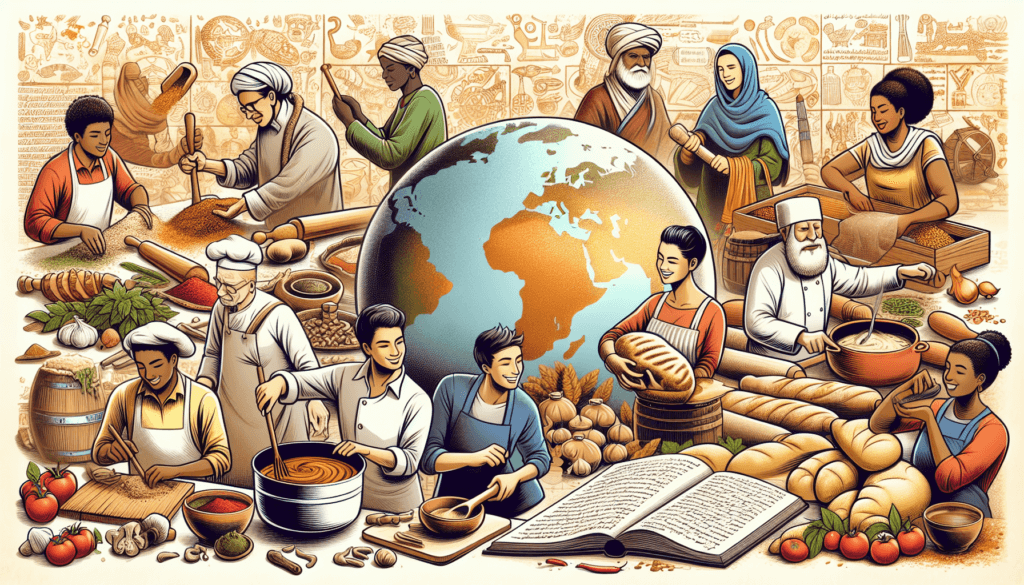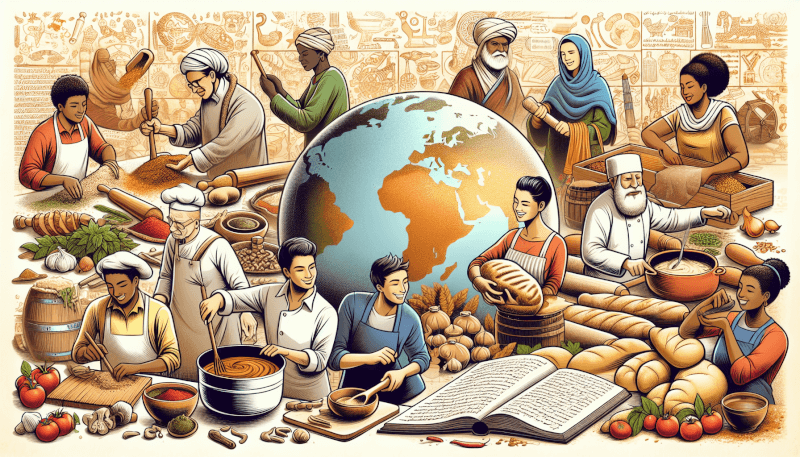In the captivating world of Global Gourmet Adventures, the rich tapestry of traditional recipes is not only cherished but also preserved. These culinary escapades take you on a mouth-watering journey through diverse cultures, celebrating the authentic flavors that have stood the test of time. From the bustling markets of Thailand to the idyllic Tuscan countryside, you will discover how these treasured recipes are handed down through generations, ensuring that their essence and magic continue to tantalize taste buds around the globe. Embark on a gastronomic voyage like no other, where the preservation of tradition is lovingly intertwined with the thrill of new culinary experiences.

Preservation Methods
Oral Tradition
Oral tradition is one of the oldest and most fundamental methods of preserving traditional recipes. Passed down from one generation to another through storytelling, this method allows for the transmission of not only recipes but also cultural values and traditions. By engaging in conversation and hearing the stories behind the recipes, one can gain a deeper understanding of the culinary heritage and the significance of certain ingredients and techniques. While oral tradition may be vulnerable to changes and adaptations over time, it serves as a valuable source of information that keeps traditional recipes alive.
Written Recipes
Written recipes are another important method of preserving traditional cuisine. These recipes provide a detailed account of the ingredients, measurements, and cooking instructions, ensuring consistency and accuracy in recreating traditional dishes. They can be compiled in hand-written recipe books or shared through handwritten recipe cards, allowing families to pass down their culinary traditions to future generations. Written recipes offer a tangible connection to the past, allowing individuals to recreate beloved family recipes and keep the flavors and memories alive.
Cookbooks
Cookbooks have played a significant role in preserving traditional recipes and making them accessible to a wider audience. These publications often go beyond just providing recipes and delve into the history, cultural significance, and regional variations associated with traditional dishes. They not only serve as a resource for those seeking to recreate traditional recipes but also serve as historical records that document the evolution of a culinary culture. Cookbooks also provide a platform for chefs, food experts, and home cooks to share their knowledge and passion for traditional cuisine with the world.
Digital Platforms
In the digital age, traditional recipes have found a new home on various online platforms. Websites dedicated to traditional cuisine act as virtual repositories, offering a vast collection of recipes from different cultures. These platforms allow people from around the world to easily access and learn about traditional recipes, regardless of geographical barriers. Online platforms also encourage community engagement through user-generated content, allowing individuals to share their own traditional recipes and personal stories, fostering a sense of belongingness in the global culinary community.
Video Documentation
Video documentation has become an increasingly popular method of preserving and sharing traditional recipes. With the rise of platforms like YouTube and social media, individuals can now visually learn how to cook traditional dishes from experienced home cooks, chefs, and culinary experts. These videos not only provide step-by-step instructions but also capture the essence, techniques, and cultural significance associated with each recipe. By visually demonstrating the cooking process, video documentation ensures that the nuances and intricacies of traditional recipes are properly showcased and understood.
Culinary Training Programs
Traditional Cooking Classes
One of the most immersive ways to learn and preserve traditional recipes is through traditional cooking classes. These classes are typically taught by experienced home cooks or chefs who possess extensive knowledge of traditional culinary techniques and recipes. By participating in hands-on cooking sessions, individuals can learn the specific skills, techniques, and cultural context associated with traditional dishes. Traditional cooking classes often emphasize the use of authentic ingredients and traditional cooking methods, ensuring that the integrity of the recipes is maintained.
Apprenticeships
Apprenticeships have long been a traditional method of culinary training and preservation. Aspiring chefs have the opportunity to learn directly from experienced cooks or chefs who specialize in traditional cuisine. These apprenticeships not only teach culinary skills but also impart knowledge about traditional recipes, ingredients, and cooking methods. By working closely with mentors, apprentices gain a deep understanding of the cultural and historical significance of each recipe, ensuring that the traditions are preserved and carried forward.
Culinary Schools
Culinary schools play a crucial role in preserving traditional recipes by offering specialized programs that focus on traditional cuisine. These schools provide students with a comprehensive education in traditional cooking techniques, regional variations, and the cultural background of various traditional dishes. Through hands-on training, aspiring chefs are equipped with the skills and knowledge necessary to recreate traditional recipes with authenticity and respect. Culinary schools often collaborate with experienced chefs and culinary experts to ensure that traditional culinary traditions are properly taught and preserved.
Cultural Exchanges and Collaborations
Cross-cultural Culinary Experiences
Cross-cultural culinary experiences bring together culinary traditions from different cultures, allowing for the exchange and preservation of traditional recipes. By organizing events, workshops, or classes that showcase cuisines from different regions, individuals have the opportunity to learn about and appreciate the culinary heritage of other cultures. These experiences not only foster cultural understanding and appreciation but also serve as a platform for chefs and home cooks to share their traditional recipes and cooking techniques with a wider audience.
International Chef Exchanges
International chef exchanges serve as a means to preserve and promote traditional recipes by facilitating collaborations and exchanges between chefs from different countries and culinary backgrounds. During these exchanges, chefs have the opportunity to work together, share their knowledge, and learn from each other’s culinary traditions. By incorporating traditional recipes and techniques into their respective menus, these chefs contribute to the preservation and evolution of traditional cuisine on a global scale.
Collaborative Cookbooks
Collaborative cookbooks bring together the expertise of multiple chefs or culinary experts to create a comprehensive collection of traditional recipes. By pooling their knowledge, chefs can document traditional recipes and their personal interpretations, ensuring that the culinary traditions are preserved and celebrated. Collaborative cookbooks often feature recipes from different cultures, providing readers with a diverse range of traditional dishes to explore and recreate.
Food Festivals and Events
Food festivals and events dedicated to traditional cuisine serve as a platform for preserving and sharing traditional recipes with a wider audience. These events often feature traditional food stalls, cooking demonstrations, and cultural performances, allowing attendees to immerse themselves in the culinary heritage of various cultures. By showcasing traditional recipes and techniques, these festivals and events ensure that traditional cuisine remains vibrant and relevant in a rapidly changing culinary landscape.


